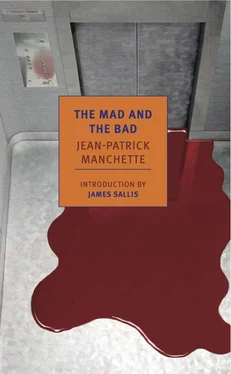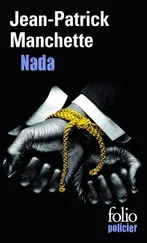Jean-Patrick Manchette - The Mad and the Bad
Здесь есть возможность читать онлайн «Jean-Patrick Manchette - The Mad and the Bad» весь текст электронной книги совершенно бесплатно (целиком полную версию без сокращений). В некоторых случаях можно слушать аудио, скачать через торрент в формате fb2 и присутствует краткое содержание. Год выпуска: 2014, ISBN: 2014, Издательство: New York Review Books, Жанр: Криминальный детектив, на английском языке. Описание произведения, (предисловие) а так же отзывы посетителей доступны на портале библиотеки ЛибКат.
- Название:The Mad and the Bad
- Автор:
- Издательство:New York Review Books
- Жанр:
- Год:2014
- ISBN:9781590177402
- Рейтинг книги:4 / 5. Голосов: 1
-
Избранное:Добавить в избранное
- Отзывы:
-
Ваша оценка:
- 80
- 1
- 2
- 3
- 4
- 5
The Mad and the Bad: краткое содержание, описание и аннотация
Предлагаем к чтению аннотацию, описание, краткое содержание или предисловие (зависит от того, что написал сам автор книги «The Mad and the Bad»). Если вы не нашли необходимую информацию о книге — напишите в комментариях, мы постараемся отыскать её.
The Mad and the Bad — читать онлайн бесплатно полную книгу (весь текст) целиком
Ниже представлен текст книги, разбитый по страницам. Система сохранения места последней прочитанной страницы, позволяет с удобством читать онлайн бесплатно книгу «The Mad and the Bad», без необходимости каждый раз заново искать на чём Вы остановились. Поставьте закладку, и сможете в любой момент перейти на страницу, на которой закончили чтение.
Интервал:
Закладка:
“Quite the little rebel,” he observed. “I know all about you. Pickpocket. Arsonist. Congratulations.”
“Of course you do,” replied Julie. “It’s all in my file.”
“You, all you poor people, are just too stupid. You go about things in the dumbest way.”
“Everyone can’t inherit money.”
Hartog shrugged.
“For my part I do something with my inheritance. You people wouldn’t know what to do with one. You, Fuentès and company, people like you. What I do is create a work.”
“It’s all about money,” said Julie. “Money and little drawings.”
“Little drawings, little drawings,” Hartog repeated vaguely.
The lower part of his face was rigid. Pulling himself together, he took a three-part folder from his desk and shook it, causing a stream of 21 cm x 27 cm photographs to cascade out.
“A work-goddammit, a work!”
He was swearing but seemed calm. He struck his sternum with the flat of his hand. Perspiration trickled abnormally, obscenely down his hairless white body. The redhead stood up and turned his shaver on. Julie examined the photos distractedly. Houses. Buildings. On the back of each were noted place and date. Julie finished her coffee. Hartog switched his shaver off.
“Don’t you admire my work?”
“With lots of cash you can do whatever you want.”
“I create beauty,” said Hartog.
Julie did not bother to reply. The redhead put his shaver down without wiping it.
“I have some jobs for you,” he said in a suddenly altered tone of voice. “I’m taking a plane at eight o’clock. I’ll be gone for three days. You’ll have to manage without me. Mademoiselle Boyd, my secretary, will be here. You can call on her if you need funds.”
Julie nodded absently. She was looking at a photograph.
“This one I like,” she murmured. “Definitely.”
Hartog took the photo from her hands and scrutinized it. It showed an almost chaotic group of low buildings spread across a mountain crest. It looked as if ruins from various places had been assembled, linked up by more recent masonry, and added to over the years by fresh disordered elements. Between drystone walls and slate platforms were slung rickety catwalks, and here and there were sugarloaf structures never more than three or four meters tall. Vegetation flourished in patios, crannies, and roof corners.
A violent flush darkened Hartog’s features and spread visibly down his narrow torso as far as the bandage. The redhead scratched his scalp in agitation.
“You do have your nutty side,” observed Julie benevolently. “All this stuff here is your work, isn’t it?”
Hartog nodded. “My folly.”
“Do people like it?”
“My folly,” the redhead said again. “Folly-meaning, as you well know, a place of pleasure and fantasy. An aerie. .”
He seemed to regain his self-confidence as he talked.
“This is where I gave full rein to my imagination,” he said with satisfaction. “Perhaps it was even a bit childish. But every man needs a place to be alone, to get away from himself. The place is more restful for me than a Trappist monastery.”
A drop of perspiration fell from Hartog’s round forehead onto the glossy print. He tossed the picture towards the table and turned away. The photo fluttered, hovered, and fell into Julie’s lap.
“Would you like a drink?” asked Hartog, his back still turned.
“At this hour?”
“I’m having one. Feel free to help yourself.”
Leaning over a built-in panel, he was opening a minibar. The house was full of bars. A drinker’s paradise.
“Goodbye,” said Hartog without turning around.
Stiff-backed, glass in hand, he left through the side door, and Julie hesitated for a moment before pouring herself a brandy, which she downed, standing, in a single gulp, reminded of a time when, freezing cold at dawn, she would stand at a bar and wash down black coffee with four shots of calvados at the start of a day of wandering, tears, fatigue, and despair.
8
After Hartog left, Julie went to the kitchen to get Peter’s breakfast. There she found the valet Georges eating a sloppy omelet at one corner of the immense table. The fellow was in suspenders. His eyes were bloodshot. He got to his feet as Julie approached.
“Madame Boudiou is doing better,” he offered, his mouth full. “I’ll get you something for the snotty brat.”
Egg yolk dribbled down his chin.
“Don’t go to the trouble,” said Julie. “I’ll manage.”
She piled little boxes of cereal, which looked like little boxes of laundry detergent, on a tray. She could hear the valet chewing behind her.
“While you’re at it, would you open me a bottle of Guinness?”
Julie complied silently, placing the beer and a glass in front of Georges. The valet drank greedily and it seemed to make him feel better. Color returned to his cheeks.
“Is it true what they say, that you were in the nuthouse?”
“It’s true.”
Georges was embarrassed. “Before that, you were a domestic?”
“Before that, I was a juvenile delinquent.”
Georges was even more embarrassed.
“Would you excuse me please,” said Julie.
She left the room with her tray, taking the service elevator. Clamped between her elbow and her side was the photograph of Hartog’s folly. She was not conscious of having kept it.
The girl entered Peter’s room. The little boy was awake, playing with toy cars. He consulted an electric watch.
“You’re late.”
“Good morning,” said Julie.
“Where is Marcelle? Where is Old Polio?”
“She has left. I’m her replacement.”
Peter shrugged. “You’re late,” he repeated.
“Your uncle is going away. I had to say goodbye to him.”
“He never comes to see me.”
Julie put the tray down on the table and poured hot milk over instant cocoa and cold milk into a bowl.
“That’s because he is very busy.”
“No, it’s because he doesn’t love me. Nobody loves me, except for Marcelle. She told me so herself.”
“She was wrong,” replied Julie flatly.
Peter made no reply and went and sat at the table. He poured all kinds of cereal into the bowl of milk and began eating greedily. A knock came at the door. Julie opened the door. In the hallway was a very tall baby-faced man, very blond, wearing a blue suit.
“-oiselle,” he was saying, “I have the television set.” He gestured towards a large cardboard box beside him on the floor.
“Who are you?” asked Julie, taken aback.
“I’ve brought the television. Isn’t this the place?” He consulted a slip of paper. “Downstairs they told me it was here.”
“A TV! A TV!” cried Peter, jumping up and down.
“Yes, it’s definitely here,” said Julie. “But I wasn’t expecting you.”
The blond giant brought the large box into the room. Immediately nervous, Julie went over to open the window, raising the blind.
“Where should I set it up?”
Julie, stock-still, was gazing down at the street, at a white raincoat with epaulettes. A bus moved forward, blocking her view of it.
“Mademoiselle?”
The bus passed on. No more white raincoat. Julie turned.
“Mademoiselle. Where should I set it up?”
“Anywhere you like. On the floor. Over there. Near the socket for the antenna.”
Julie was jittery. The blond giant was opening the cardboard box. He was in no hurry. Julie stroked Peter’s fine- too fine-hair.
“You see, he does love you, your uncle,” she said distractedly. “This new television is his way of saying goodbye.”
“Anything I break,” said Peter, “they give me a new one.”
9
After breakfast Julie decided to take Peter to the Jardin du Luxembourg.
Читать дальшеИнтервал:
Закладка:
Похожие книги на «The Mad and the Bad»
Представляем Вашему вниманию похожие книги на «The Mad and the Bad» списком для выбора. Мы отобрали схожую по названию и смыслу литературу в надежде предоставить читателям больше вариантов отыскать новые, интересные, ещё непрочитанные произведения.
Обсуждение, отзывы о книге «The Mad and the Bad» и просто собственные мнения читателей. Оставьте ваши комментарии, напишите, что Вы думаете о произведении, его смысле или главных героях. Укажите что конкретно понравилось, а что нет, и почему Вы так считаете.












